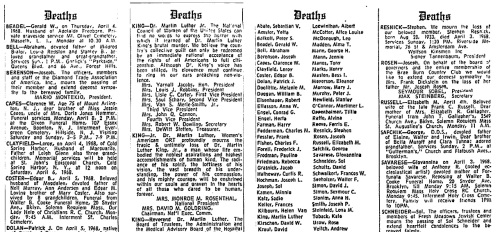“We mourn the tragic death of a hero in the fight for human rights. We weep for his family. We weep for the nation.”1
You’ve likely read about Dr. Martin Luther King, Jr. in your history classes and heard second-hand accounts about the impact he had on the Civil Rights Movement in the United States. Perhaps you’ve heard the stories recounted so many times that you can no longer hear the passion in his words or feel the fear, anguish, or horror that many felt after his death. Primary resources such as newspaper articles may help to give you a deeper and more personal understanding of the stories you have heard hundreds of times before.
The above quote is just one of many obituaries published in the New York Times shortly after Dr. Martin Luther King, Jr.’s death. In fact, if you search the New York Times Obituaries between April 5 and April 11, 1968, you will find 90 obituaries for Dr. King. That’s right – 90 of them! Various groups and individuals paid tribute to Dr. King expressing anguish, sadness, and camaraderie.
I bring up the New York Times articles because the library recently renewed its contract to keep the Historical New York Times database available to you. This is a great primary resource that allows you to experience history as it happened, as though you were right there with the individuals who were reading it for the first time at their breakfast tables, a paper copy of the New York Times in hand.
The Historical New York Times covers regional, national, and international news between 1851 and 2008. You can even find some local news, such as articles relating to the 1968 explosion in Richmond, Indiana. I encourage you to take advantage of this valuable resource. Point your browser to Historical Newspapers: The New York Times (1851-2007) and immerse yourself in the history!

1 “Obituary 1 — no Title.” New York Times (1923-Current File), Apr 06, 1968. http://search.proquest.com/docview/118202956?accountid=11648.

